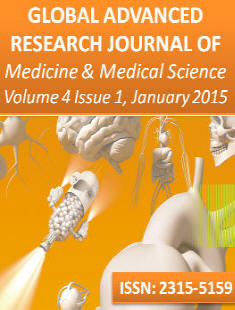|

January 2015 Vol. 4 Issue
1
Other viewing option
Abstract
•
Full
text
•Reprint
(PDF) (562 KB)
Search Pubmed for articles by:
Salama ME
Khairy DA
Other links:
PubMed Citation
Related articles in PubMed
|
|
Global Advanced Research Journal
of Medicine and Medical Sciences (GARJMMS) ISSN: 2315-5159
January 2015 Vol. 4(1), pp.
051-056
Copyright © 2015 Global Advanced
Research Journals
Full Length Research Paper
|
Comparison of CD10
expression in stroma of epithelial and mesenchymal
tumors of the breast
Maha E. Salama1*,
Wael S. Ibrahim1 and Dina A. Khairy2
1Pathology
Department, Faculty of Medicine, Cairo University,
Egypt.
2Pathology
Department, Faculty of Medicine, Beni Sueif
University, Egypt.
*Corresponding Author E-mail:
maha.elsayed@kasralainy.edu.eg; Phone
Number: 0020-01001519184
Accepted 21 January, 2015
|
|
Abstract |
|
The stroma surrounding a tumor is of utmost
importance in deciding the tumor behaviour and
progression thus studying its nature may contribute
to finding new and effective methods of treatment.
This study aimed at
comparing the expression of CD10 in the desmoplastic
stroma of breast carcinoma and the neoplastic stroma
of phyllodes tumor. Paraffin blocks of 70
Egyptian female cases were collected, 36 cases with
invasive duct carcinoma and 34 with phyllodes tumors.
CD10 immunostaining was scored as negative
when there was no tumor stromal staining, weak
when there was diffuse weak staining or weak or
strong focal staining in less than 30% of tumor
stromal cells and strong when there was
strong staining in 30% or more of tumor stromal
cells.
Positive CD10 expression was seen in 77.8% of
invasive duct carcinoma and 32.4% of phyllodes tumor.
In invasive duct
carcinoma, most grade I cases showed weak CD10
immunostaining
(66.7%),
while most of grade III cases showed strong CD10
staining (71.4%) (p<0.001). In phyllodes tumors,
most of benign cases were CD10 negative (83.3%),
while
strong CD10 staining was seen in 60% of malignant
cases (p<0.001). In conclusion, CD10 was more widely
expressed in the desmoplastic stroma of invasive
duct carcinoma rather than the neoplastic stroma of
phyllodes tumor. Moreover, stromal CD10 expression
seemed to correlate with the tumor grades in
invasive duct carcinoma as well as phyllodes tumors.
Keywords:
CD10, breast, immunohistochemistry, phyllodes, duct
carcinoma
|
| |
|
